Chapter 12
Habit 6 – showing good manners
Being polite and well-mannered are habits that are usually formed early in life. This chapter looks at how we define manners and the benefits of displaying them. We will also consider how rudeness can be seen in a different light.
•Agreeing on what good manners are
•The benefits of good manners
•Answering back – an example
Agreeing on what good manners are
Our definition of good manners is a matter of personal choice, with some heavy cultural influences. An exercise that you might want to try by yourself is to consider what you think good manners are, and why you personally would want to show these towards others. What effect do you think demonstrating good manners has on you and others? This exercise in itself could help to clarify exactly why you would want to ensure that you do show good manners, and what it is that you are trying to impart to a child. The exercise could also ensure that you are a living role model! Children are very likely to imitate what they see.
Try to remember to share the explanation of why you are doing what you are doing, so that these explanations are registered in the child’s Computer. When we understand the reasoning that underpins an action, the action is much more likely to be carried out and be acceptable to us.
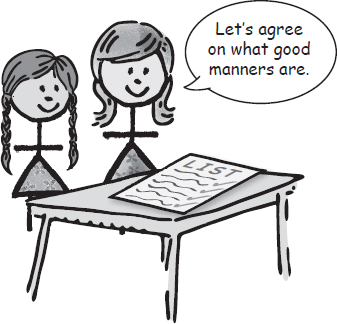
Children will demonstrate good manners if it makes sense for them to do so.
What are good manners?
As a suggestion for an activity, draw up a list with your child of what good manners are. Children generally enjoy structure, so forming a list is a helpful way to establish desired behaviours. By helping to draw up the list, the child will be taking ownership of the list and this makes it much more likely that the child will work with the list.
Your list of good manners will depend on what you think are good manners. Here are some examples of what many people might agree on:
•Showing appreciation with a ‘thankyou’
•Using the word ‘please’ and being polite
•Showing respect towards others and property
•Not being selfish or greedy
•Being considerate
•Putting others first
•Offering help to those in need of help
•Not offending others
•Giving compliments and not making unpleasant remarks
•Not gossiping
•Respecting cultural norms
The child could be encouraged to play a game, such as how many times they might display a specific good manner for one day. For example, how many times they are courteous to others or how many times they say ‘thankyou’ to others.
Important point
If a child doesn’t know what good manners are, or the reason why we display good manners, then they are unlikely to demonstrate them.
The benefits of good manners
Just as giving a gift with no strings attached makes both the giver and recipient feel good, showing good manners has a number of benefits too. Here are a few examples of the benefits:
Gratitude and improved general well-being
You could define gratitude as demonstrating an appreciation of the things that are important to you. We often overlook things and people in our lives and take them for granted. By stopping to appreciate what we have and who we have in our lives, we can gain a sense of gratefulness. By expressing gratitude, such as thanking others, we can be seen as polite and well mannered.
Simple acts of gratitude can have significant consequences in terms of our general well-being.[1] There is evidence that helping a child to focus on the good things in their life can have emotional and interpersonal benefits, if they do this with a sense of gratefulness.[2]
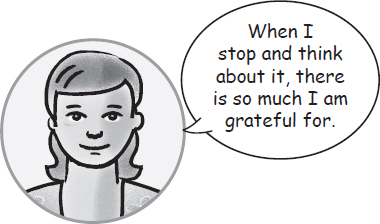
As adults, we experience a more positive perception of a partner when we express gratitude. This is also true with friendships. A consequence of this is that where gratitude is shown, partners and friends are more able to be frank about any relationship concerns.[3] When we show gratitude towards someone, it makes them feel respected and valued and they are more likely to help us.[4]
Important point
Expressing gratitude can strengthen relationships.
Improved confidence
Good manners can bring confidence. In many social settings, children have no knowledge of how to act. By giving the child a set of learnt behaviours, such as manners for particular circumstances, the child will have a set of behaviours to fall back on. Routines will give the child some sense of security, especially if their behaviour results in approval, which is perceived as a positive outcome.
Avoiding distress
By being considerate to others we show respect, whereas rude behaviour shows disrespect and can damage relationships. Rude behaviour has been shown to later produce anxiety, sorrow and pain in the person being rude.[5] Children who are rude often do so because they are being defensive and lack confidence. This rudeness can be rewired by positive learning experiences.[6] One function of the Chimp, especially the orbitofrontal area, is to make sure everyone accepts us.[7] Distress is not unusual if we think we are being criticised or rejected. Therefore, positive feedback on any helpful behaviour will strongly encourage this helpful behaviour to be repeated.
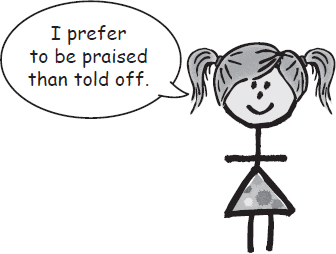
Sometimes, children showing a lack of manners appear to be rude because they have not practised the habit of displaying good manners and are caught off-guard. They do not want to be rude.
Answering back – an example
Marcus’s parents are being driven to distraction because Marcus cannot stop answering back. Despite telling him that it is rude to answer back, he still continues to do it. They are concerned that he will continue doing this as he enters adult life and this will be unpleasant for all of those around him and do him no favours. What could they do? Here is an offer of a solution for approaching this.
We could look at four separate parts to the solution:
1.Marcus needs to be operating with the same understanding as the adult speaking with him
2.Marcus needs to accept that he has a Chimp that will always react quickly
3.The adult needs to accept that Marcus has a Chimp and not react and go into Chimp mode themselves
4.The adult could instil a Computer programme into Marcus for when a challenge happens
1 – The same understanding
In order to explain this idea, I am going to challenge what we mean by answering back. I will give an exaggerated example to bring the point to life.
Imagine a scenario where you are at work and one of your senior managers announces that, from now on, your hours of work will be changed. There is no discussion and you will be expected to do hours that are really inconvenient to you. Not impossible, but definitely inconvenient. When you try to ask about the reasoning, or to see if there is any negotiation around this, you are abruptly told to stop answering back and to get on with it. To add to this, you are told not to mention it again and that if you do, this will be seen as rude and insolent and there will be consequences. Pretty unpleasant!
What you would want to do is to understand the situation and in the end accept it, provided it is reasonable, even if you might not agree. This is your employer, after all, and they pay your wages! If their reasoning is sound and legal, although not pleasant, then the hours might have to change. What you wouldn’t expect is to be given no explanation, or a warning or threat, which stops you from expressing your feelings or ideas.
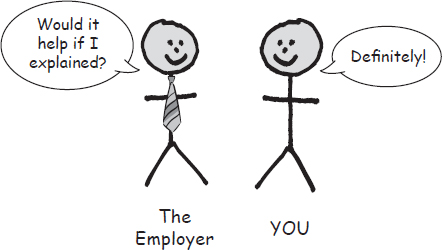
At the same time, what the employer wouldn’t want, if they were being reasonable and allowing you to question the decision, is some abusive, aggressive or rude approach from you when you do respond. Therefore, what you are likely to do is to be assertive and ask if you could understand their reasoning and then discuss this. Marcus is trying to do the same, but he hasn’t got the skills.
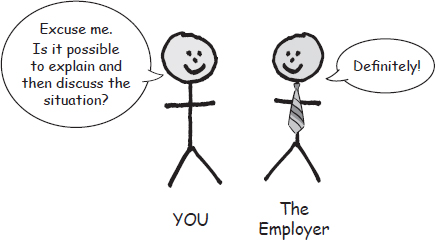
If your employer took the time to sit down and explain why they have to make some decisions that you might not like or agree with, you might feel differently about the situation. Now that you have an explanation and you can understand what your employer is saying, you are both operating with the same understanding. This means that you can appreciate why you are being asked to agree to change your hours.
There is little difference between this scenario and a child being told what to do, without explanation or being able to discuss the situation.
2 – The Chimp reacts quickly
Even though you have the explanation for your change of hours, your Chimp might still try and react rather than allowing you, the Human and Computer, to use your interpersonal skills to discuss the situation and see if there is a compromise. As adults, we tend not to react because we have developed some measure of interpersonal skills, which mainly operate via our Computer. We have learnt how to respond appropriately.
Teenagers and young children are on a steep learning curve. This is not just about facts and methods; it is also about reasoning and interpersonal skills. Even if the child understands what you are saying, they are unlikely to have the interpersonal skills to then discuss this in an adult and polite manner. Instead, their Chimp will react and is likely to present the child as being rude, challenging and disobedient. What the child is really trying to do is to understand your reasoning and values.
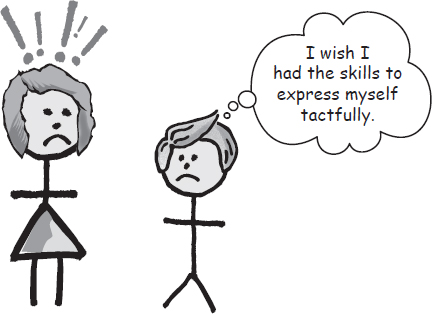
The reasoning is about appreciating why you are saying what you are saying and what consequences there will be. They are also learning about values, which can be in the form of manners. Answering back could therefore be understood as a very crude way for the child, who has poor interpersonal skills and poor Chimp management, to try and understand your stance. The answering back is the Chimp taking over with a fast and probably rude reply.
3 – Acceptance with dignity!
Many parents tell me how they go totally Chimp themselves when their child’s Chimp prods them with constant answering back. This can lead to a loss of dignity, and on reflection, they realise that this is not the best response.
It can help if you can see answering back in a different light. It is the child’s way of learning. They don’t intend to be rude. They just don’t have the interpersonal skills to silence their Chimp and allow their Human to respond in a tactful and appropriate way. If you can accept these points, then it is less likely that your own Chimp will react with an equally unreasonable and rude response, and this might help you to retain your own dignity!

4 – The way forward
How could you move forward with your child to get a better outcome when they have a natural Chimp outburst? You could work with your child to instil a Computer programme for when a challenge happens.
Here are some suggestions that might help you to do this. First remember that we are all prone to react quickly via our Chimp to anything that doesn’t please us. It is so important for you not to muddle your child up with their Chimp and also not to muddle yourself up with your own Chimp.
Begin with the outcome that you would like to happen. Most people will probably say:
•I would like my child to understand why I am asking them to do something or to accept something that they will not find pleasant
•I would also like to be calm and in a good place myself throughout the entire interaction
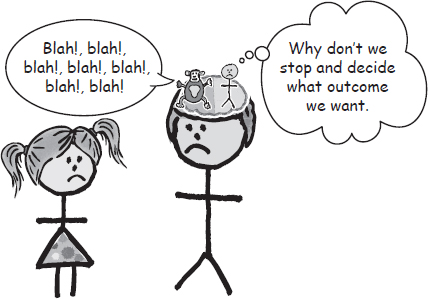
If we begin with this premise, then the starting point is to make sure that you are in a good place and well prepared before the incident takes place. This way, your Chimp won’t get involved because the Computer within you will respond with a programmed response to manage your own emotions.
To get into a good place, try asking yourself what you would expect a normal, healthy Chimp to do when it is told to do something it doesn’t want to do? So, if there is an outburst from the child’s Chimp, remain calm and celebrate this as normal and healthy! This is a choice that you can make: celebrate or get annoyed.
If you have decided that your child’s behaviour is therefore normal and healthy, but not acceptable, you will have a basis for discussing this with the child.
It might be worth putting other facts into your Computer to help you to remain in Human mode. Here are some suggestions:
•When the child’s Chimp reacts, it will be a learning opportunity for the child
•Some children need to know what isn’t acceptable before they understand what is acceptable
•Most children go through a rebellious stage – this doesn’t last forever
•This is a chance for the child to learn to manage their own Chimp
•This is an opportunity for you to learn to manage your
Chimp!
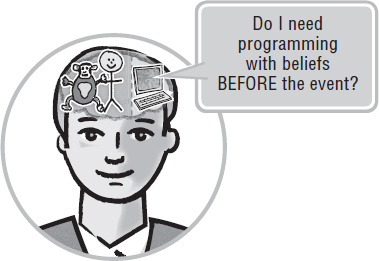
The second part of the plan is to discuss the situation with the child. Clearly, this is best done when the child is quiet and in a receptive state. It is best to try and have these discussion before any incident happens rather than during.
The child needs to understand that their Chimp is likely to hijack them when it hears something unpleasant, especially an instruction or request from the person in charge. This reaction is probably going to involve their Chimp speaking and reacting in a way that is not demonstrating good interpersonal skills. In other words, the child needs to appreciate that poor reactions from their Chimp won’t help them to get a good response from the person being ‘attacked’.
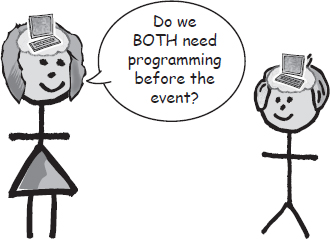
The discussion could include explaining what is acceptable as a response. The child needs to know what they can do when they can’t have what they want. So for example, they could ask you for help to manage their Chimp and talk to it. Discussions could also include exactly what are helpful interpersonal skills, and how asking about, or challenging, conflicting instructions in a constructive way is one worth learning. This way you are much more likely to get a constructive discussion to take place, and a better outcome.
How can you achieve a really good response from the child’s Computer rather than their Chimp? One method, which most children like, is to role-play some different scenarios.
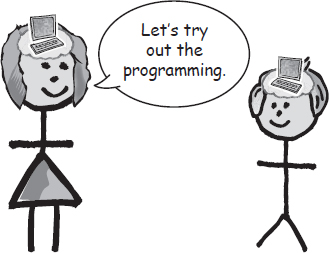
You could always choose the ones that you know are likely to occur for your particular child. It will probably help you to choose the ones that are also likely to get your own Chimp out. Here are some suggestions:
•Getting ready for school
•Eating food that they don’t like
•Stopping play when a meal is ready
•Getting homework done
For each scenario, try to first explain to the child why the request is being made and the effects it has if it is not carried out. Then try to help the child to form a plan for their Computer to carry out, in order to prevent their Chimp from taking over and doing something that they will later regret. Then act the scenario out and, if the child manages, praise them generously. Seeing an instruction as a game that needs carrying out might result in the child’s Chimp actually joining in so that it can win and receive the praise.
Summary
•Agreeing on what good manners are helps a child to take ownership
•If a child understands the reasoning behind good manners, they are much more likely to display them
•Good manners can bring well-being, confidence and improved relationships
•Chimps don’t do manners, only Humans can, and the Computer carries them out
•Try not to muddle your child up with their Chimp when it comes to displaying manners